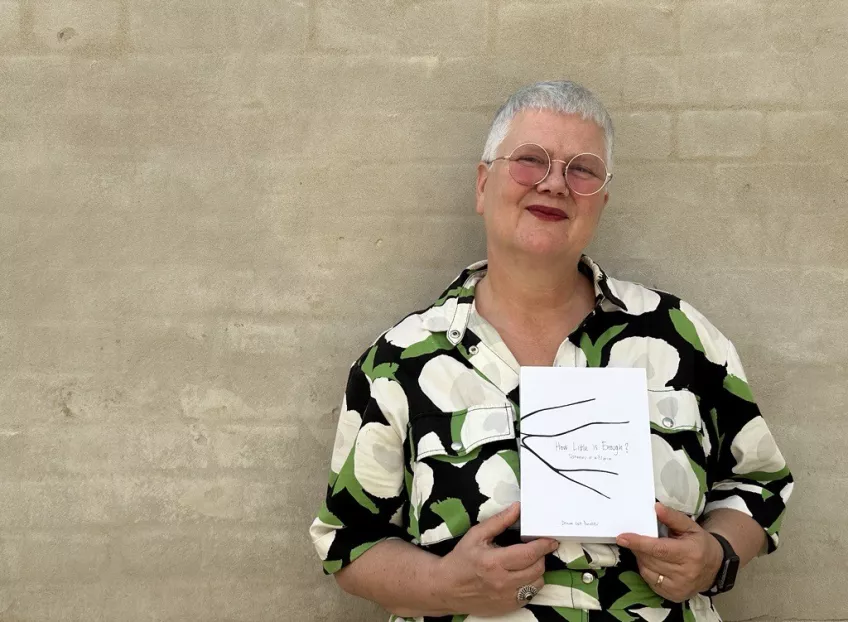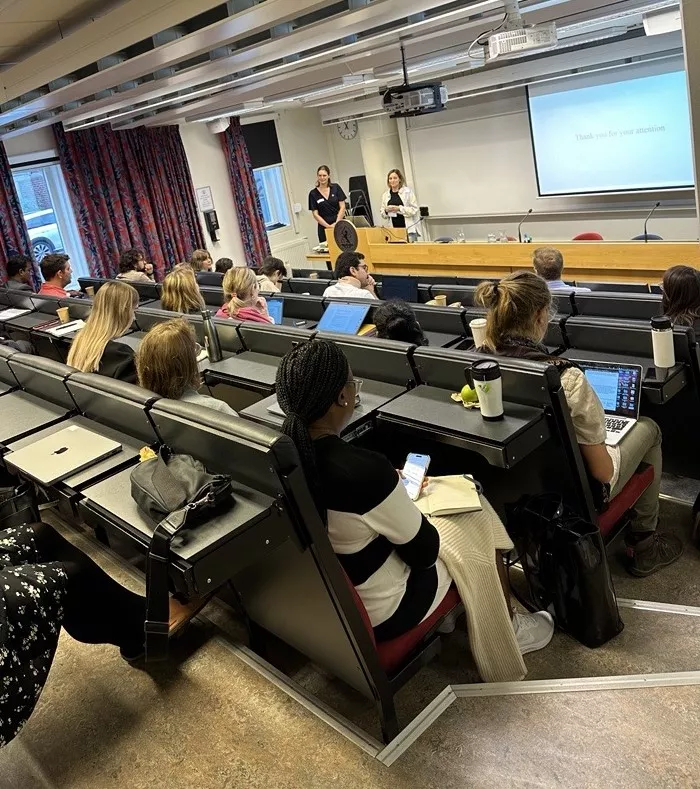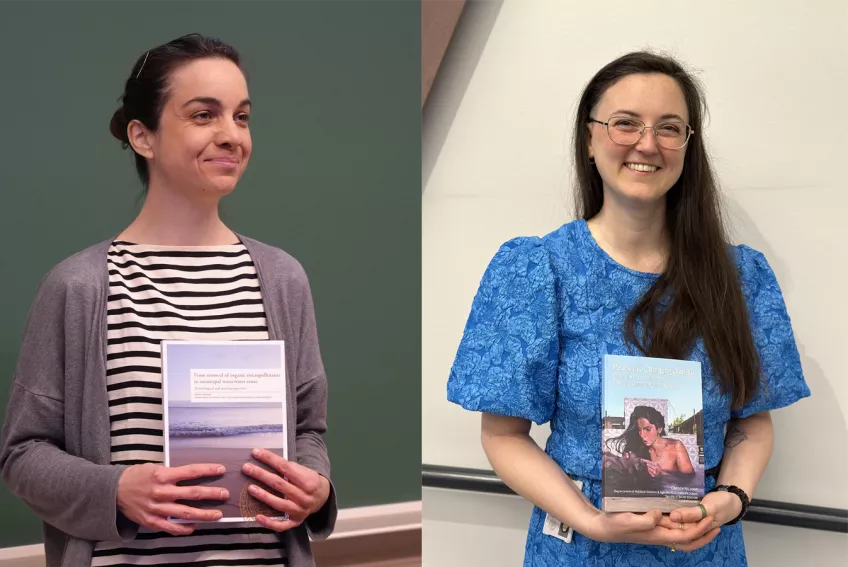News 2024
October 2024
Jesica López, a PhD student at the Agenda 2030 Graduate School, successfully defended her thesis on 11 October. Her research presents sustainable solutions to protect the Amazon rainforest, with a focus on reducing deforestation caused by cattle ranching in Colombia.
Jesica's work emphasizes the need for improved land use practices, stricter environmental regulations, and collaboration with Indigenous communities to develop sustainable livelihoods. She will also present her findings at the upcoming COP16 biodiversity conference in Colombia.
Jesica has been featured in the Lund University Magazine (LUM) and in the LU newsletter Apropå. She has also been published in The Conversation. Read more about her research below.
Read more about her thesis
Read more about Jesica López in LUM (on how to plan for safe fieldwork)
Read her article on the Colombian Amazon in The Conversation
September 2024
New thesis: How little is enough?
Steinunn Knúts-Önnudóttir not only has a background as a director, writer, theologian, life coach and actor. When she started her PhD in Lund, she was also an academic dean in her native Iceland.
With the question 'How little is enough?' she has explored how little it really takes to create an artistic, transformative experience. On 27 September she successfully defended her thesis, including a performance with the audience!
Read more about Steinunn's research
PhD Conference on Sustainable Development
On 24 September, we held our annual PhD Conference on Sustainable Development. The day was filled with a wide range of presentations, discussions and activities, all focused on issues related to sustainability. Among the speakers were Emelie Lantz, Georgios Tsiakiris, Iury Salustiano Trojaborg and Juan Antonio Samper from the Agenda 2030 Graduate School.
Some examples from the programme included:
- A panel discussion on human rights, climate science and interdisciplinarity, offering valuable perspectives on global challenges.
- Presentations on topics as diverse as civil society in a polarised world, organisational justice, transformative dimensions of fieldwork, degrowth initiatives and bio-economy innovation systems.
- A seminar on creating sustainable workplaces and a common reading session.
- A session on climate modelling, in which researchers shared insights into Earth system modelling as a tool for environmental research.
- Poster presentations showcasing research on topics such as fire and conflict in Iraq, urban forests in daylight and at night, spatial machine learning to study child stunting in Rwanda, and more.
This is just a selection of the many enriching sessions that made up the day. The conference concluded with a networking session and after work where conversations continued.
Sustainable urban development thesis
Can a newly built neighbourhood be a spearhead for sustainability when its core is a huge shopping mall? And to what extent can urban planning influence the way people live in an area? Alva Zalar uses a norm-critical perspective where architecture and queer theory are interwoven in her thesis on sustainable urban development in Hyllie, south of Malmö. Alva successfully defended her thesis on 20 September.
Read an interview with Alva about her research here.
New anthology on critical animal studies
Agenda 2030 PhD student Naja Yndal-Olsen has co-edited a new anthology on 10 years of critical animal studies at Lund University, Reimagining Species Relations: A Decade of Studying and Teaching Critical Animal Studies at Lund University. She's also written one of the chapters looking at different forms of activism.
Naja's chapter examines the Danish 'Turbo Chicken' campaign, which aims to end the production of the fast-growing industrial chicken breed Ross 308. The chapter outlines the key differences between three positions in animal advocacy - welfarism, new welfarism and abolitionism - and explores how activists navigate the deep tensions between these approaches in practice. The study highlights the complexity of activist strategies, revealing a tangled terrain of collaboration that goes beyond conventional classifications of activism.
Naja Yndal-Olsen's personal page
June 2024
The Planetary Health Diet
The Planetary Health Diet aims to keep us healthy while feeding a future world population of 10 billion. But does it reduce strokes, premature deaths, and greenhouse gas emissions?
Agenda 2030 PhD student Anna Stubbendorff tackled this by comparing different dietary indices, with her own index coming out on top. The results are published in the prestigious Lancet Planetary Health.
Stubbendorff's Index paves way for sustainable healthy diets
Tanya Andersson defended her thesis
Our PhD student, Tanya Andersson Nystedt, successfully defended her thesis and now has her PhD. Her research on sexual violence among young migrants is both timely and necessary.
Thesis successfully defended by Tanya Andersson Nystedt
Existential sustainability
In recent years, there has been a growing need in society to broaden the conversation about sustainability beyond the traditional pillars of social, environmental and economic concerns. There's a call to include the existential dimensions of human life.
The Agenda 2030 Graduate School offered a PhD course on existential sustainability, which concluded with a student conference with paper presentations. The course was collaborative effort between the Center for Theology and Religious Studies and the Department of Architecture and Built Environment at LTH.
Introduction by Ida Sandström, Johanna Gustafsson Lundberg, Lovisa Nyman: Expanding the Discourse on Sustainability: Existential Sustainability
Alice Jansson: Existential Sustainability and The Energy Transition
Gubb Marit Stigson: Challenging capitalism: Rethinking sustainability in the age of environmental despair
Kristina Carlsson Stylianides: Acknowledging Existential Sustainability in Social Work
Tide Garnow: Vulnerability and care – keys to an existential sustainable society?
An artist striving for existential sustainability
In a new article by Agenda 2030 PhD student Steinunn Knúts-Önnudóttir, the term existential sustainability is explored through an artistic research project; How Little is Enough? A Quest for Existential Sustainability. The film deals with the driving force of change and gives a personal account of what it means to be an artist striving for existential sustainability.
Link to the video article in the Journal of Embodied Research
May 2024
Study visit to UN City and SSC
On 14 May the graduate school organised study visits to the Sustainability Science Centre (SSC) and UN City in Copenhagen, Denmark.
Katherine Richardson, Nina Toudal Jessen and Rune Larsen made a presentation of the Centre and the sustainability project Transformationlabs.net. Agenda 2030 PhD students Billy Jones and Mahesh Menon, together with our coordinator Markus Gunneflo, spoke about sustainability challenges in the Global South.
At the UNEP-CC (Copenhagen Climate Centre) we got insights on "Measuring Uganda's Climate Vulnerabilities".
April 2024
Panel discussion on fieldwork
On 3 April, Agenda 2030 PhD students organised the panel discussion; "White Men in Africa", Navigating race, gender and identity in fieldwork as a European Researcher in Postcolonial Settings.
The panel discussion aimed to help navigate the complexities of fieldwork by offering advice, guidance and critical reflection on key issues in postcolonial research. The discussion was moderated by PhD student Billy Jones.
Panelists:
- Prof Dr Rachel Fiedler (Associate Professor of Theology, Mzuzu University, Malawi)
- Dr Lameck Mwewa (Deputy Vice Chancellor, Unicaf University, Zambia)
- Markus Mannberg (PhD candidate, History of Religions and Agenda 2030 Graduate School, Lund University)
- Linn Ternsjö (PhD candidate, Economic History and Agenda 2030 Graduate School, Lund University)
- Sara Lüttich (PhD candidate, Sociology, Justus Liebig University Giessen, Germany)
Agenda 2030 Award
During Sustainability Week in Lund, on Wednesday 13 April, the winner of the Lund University Agenda 2030 Award, Christie Nicoson, was celebrated with mingling, music and lectures during the award ceremony. In addition to the winner Christie, PhD students Phil Flores and Alezini Loxa received honorary mentions. All three are part of the Agenda 2030 Graduate School and this is the first time anyone from the school has won the award. They all presented their innovative research during the event.
Read more about the Agenda 2030 Award winner and the honorary laureates
Nothing more queer than nature
On April 15th, Agenda 2030 PhD student Jesica López organised, in collaboration with LUCSUS, a talk on Queer Ecology with Brigitte Baptiste who is Chancellor of Universidad Ean, Colombia, and a cultural landscape ecologist.
Brigitte Baptiste was the director of the Alexander von Humboldt Biological Resources Research Institute and has also made contributions to global biodiversity and ecosystem services, serving on various panels and committees. She advocates for the interconnectedness of queerness and ecology.
Two new PhDs in the graduate school
Congratulations to the Graduate School's two new doctors, Maria Takman and Christie Nicoson. On 26 April, they successfully defended their doctoral theses at Lund University.
Read more about Maria Takman and Christie Nicoson
February 2024
Workshop series on SDGs
During the spring, the Agenda 2030 Graduate School is organising a workshop series on some of the UN's global sustainability goals in collaboration with other research schools at the university. On 29 February, Agenda 2030 doctoral students Anna Stubbendorff and Naja Yndal Olen (pictured) participated in a workshop to give their perspectives on the theme "Zero Hunger".
Read more about the Zero Hunger workshop - sustainability.lu.se
January 2024
Brazilian Nair Ferreira Barbosa da Costa, kindly called Voinha in the family, was married off at 14. She gave birth to thirteen children, had to leave her first four children behind, fled 300 miles to escape an abusive marriage and later became a single mother. "I had the guts. If I decided to do something, I would just do it."
Now, Agenda 2030 PhD candidate Iury Salustiano Trojaborg's interviews with her grandmother Voinha have become a published research article.
Read more about the interview with Voinha
Read more about Iury Salustiano Trojaborg
A new coordinator with a passion for interdisciplinarity: Markus Gunneflo
At the turn of the year, Kristina Jönsson passed on the baton as coordinator of Lund University's Agenda 2030 Graduate School, having built it up since its beginning five years ago. Markus Gunneflo has always been interested in interdisciplinarity, and working with PhD students has been the most enjoyable part of his professional life. A perfect combination for the new coordinator of the Agenda 2030 Graduate School.
"I am excited about my new role and the Graduate School is beneficial for the University. It brings together young researchers and explores some of our most important issues for the future."












